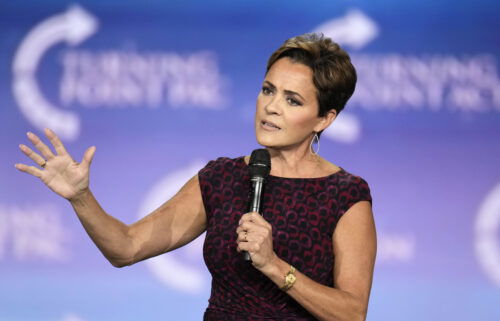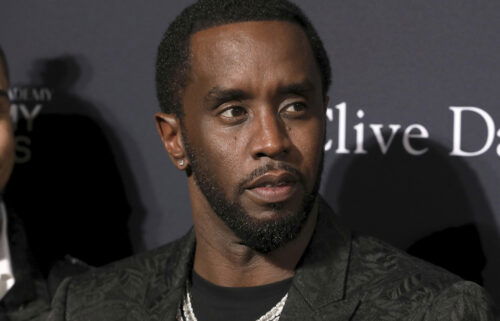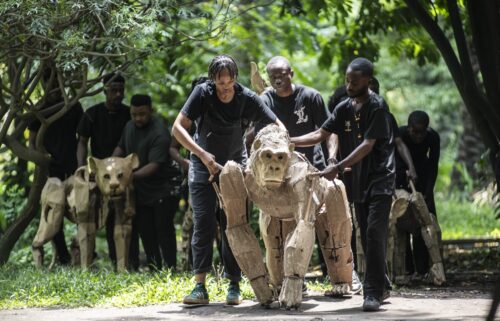Jon Hamm steals expensive stuff and likely viewers’ hearts in Apple TV+’s ‘Your Friends & Neighbors’

By MARK KENNEDY
AP Entertainment Writer
NEW YORK (AP) — “Your Friends & Neighbors” begins with a once high-flying hedge fund manager waking up in someone else’s luxurious house, next to a dead body and in a pool of blood.
How he ended up there consumes the first season of this compelling Apple TV+ series, which stars Jon Hamm and takes a peek at the lives of the ultrarich in a leafy New York suburb.
“I was interested in writing about the status symbols, about the way wealth informs community,” says creator, showrunner and producer Jonathan Tropper. “And then at the same time, what I really wanted to do is subvert it a little bit and talk about how impermanent it all is.”
Like “White Lotus” and “Big Little Lies” before it, “Your Friends & Neighbors” revolves around the woes of the wealthy and questions why we chase social status.
“Why is more always better?” asks Hamm. “Is the only metric really the accumulation of these larger and larger piles of stuff, whether it’s money or goods or houses or wives or what have you? We’re kind of arrived at this time where this story is particularly resonant.”
A cat burglar is born
Hamm plays Princeton-educated hedge fund star Andrew Cooper, who finds himself divorced and unemployable. Drowning in debt, he turns to petty crime: Breaking into neighbors’ homes to steal $350,000 watches, Hermès handbags and $32,000 bottles of chardonnay.
He rationalizes the thefts are just a quick fix until he figures out a way to get his money faucet back on. Plus, he’d never be a suspect. “I figured, ‘What’s the worst that can happen?’” he thinks.
“It’s the old story about what happens when you go bankrupt. It happens very slowly and then all of a sudden,” says Hamm. “Coop’s at the all-of-a-sudden part.”
Tropper says his show is exploring the notion of entitlement and how self-worth can be wrapped up in what people own. He’s also showing how close to disaster we all really are.
“We’re all handed a script: Do well in school, go to these colleges, get these jobs, and you’ll be set. And you can do all that and excel and get it all right and the system may still spit you out. That’s really what this show is about. It’s about this man who is in a simmering rage that the system he bought into spit him out.”
There’s a perverse delight in watching Hamm’s Cooper saunter into mansions when he knows the owners are away and make off with luxury goods, becoming a sort of down-on-his-luck burglar sticking it to the rich.
Quiet desperation
Cooper becomes acutely aware that life in this well-to-do suburb is fueled by conspicuous consumerism and country club boasting. “It’s not like I’d never noticed,” he says as the narrator. “But I guess now I was seeing it differently.”
Among the things he sees are the ways people have monetized the emptiness some men feel when they reach the top of the mountain — career, marriage, kids and prestige — and yet feel unfulfilled.
“Scotch, cigars, smoked meats, custom golf clubs, high-end escorts — entire industries built to cash in on the quiet desperation of rich, middle-aged men,” Cooper notes.
Cooper soon grapples with the underworld to fence his stolen merchandise while also hooking up with a divorcee (Olivia Munn) and scheming to get his old job back. His kids resent him and his unstable sister needs him.
Munn says its great to see Hamm tap into one of his most loved roles — Don Draper in “Mad Men,” a complex character with a flawed personal life.
“In this case, he’s this like finance bro, for whom everything has come so easily. And he’s sort of despicable, but you kind of feel sorry for him at the same time, somehow,” she says. “It’s really fun to go on the spiral with him.”
The origin of ‘Your Friends & Neighbors’
Tropper came up with the premise after living for many years in New York’s Westchester County, in which communities like Scarsdale and Larchmont are among the nation’s wealthiest.
Tropper was in a community adjacent to the kind of super wealthy one depicted in the series and watched the financial upswings where “people started to make stupid amounts of money.”
“I was a novelist. I was just feeling that it can’t possibly be sustainable,” he says. “As a non-finance person living amongst financial people, I had an insider’s access, but an outsider’s point of view.”
He’d drive down the pristine blocks and wonder what troubles were going on behind the closed doors of the mega-mansions: “What you realize is a lot of these are built on foundations of rot.”
Getting his man
Tropper pitched the series to Hamm and didn’t write the show until the actor was on board. In his head, Cooper was always played by Jon Hamm.
“He’s an actor who really walks the line perfectly between comedy and drama. And, as a result, he can behave badly and you will still sympathize with him,” says Tropper.
“Hamm is a classically handsome man who people still find relatable. And maybe that’s because everyone’s delusional, or maybe it’s because he has a certain quality that he exudes that still makes him an Everyman, even though he’s an Everyman who looks like Jon Hamm.”
Hamm, who was a fan of Tropper’s novels and TV shows that include “Banshee,” “Warrior” and the science fiction drama “See,” calls the writer a gifted storyteller and jumped aboard.
“He pitched this idea to me, which I thought had a lot of potential, not just to be an entertaining vehicle but to think about where are we as a culture and society,” says Hamm.
What’s next?
Season two of “Your Friends & Neighbors” was greenlit even before the first episode premiered. Tropper doesn’t know how far the series will go but it can’t stand still.
“I don’t believe we do five seasons of a man robbing houses,” he says. “Once we’ve got the viewer buying into this neighborhood, in this world, Coop’s survival tactics will change.
“I think the important thing with his journey is that he will never trust the system again. So we watch him struggle between wanting to keep up this lifestyle but rejecting the traditional ways of achieving it,” he adds.
“I think we’ll continue to be able to explore this community in this neighborhood and the wealth divide in our country.”




